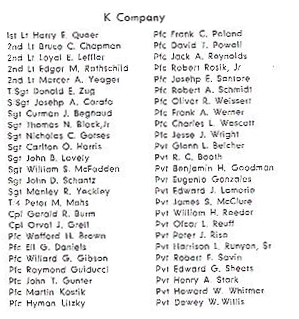
The men who died in Perry Wolff’s company.
They were late picking me up from Holland. It was a week before I joined the rearguard in Homburg, a small town on the west bank of the Rhine. Although there had not been much physical damage, we weren’t certain the enemy hadn’t left snipers somewhere. Desultory fire continued until the tanks arrived.
I never liked tanks. Armor was no protection for the foot soldier. Tanks were so large as to attract artillery fire, and so noisy that stealth was impossible. Their armor was so easily penetrated that the vehicles often caught fire and exploded. G.I.s called them Ronsons after the cigarette lighters. They did have one virtue: the back end was always hot, and the tankers carried their Jerry Cans of hot water on the rear of the vehicle. Water hot enough for powdered coffee. In the attack phase, hot food was rare.
We found the means to heat our cold canned rations in the local bank. The People’s Bank of Homburg was an ancient structure with a metal door. We invented a danger. Perhaps there was a sniper behind the door who had to be flushed out. I think it was a bazooka shell that shot the safe open, but in any case, there was no sniper. Just safety deposit boxes, blown open. Paper was strewn everywhere. The documents were pushed into a mound and a fire was lit to warm our C rations.
I don’t know what went up in that smoke. Wills and deeds, I suppose. I saw a lot of paper money. It never occurred to us Nazi currency might have residual value. There were hooked crosses on each bill and we were here to destroy the Nazis, and it was assumed, their currency.
I once told this story to the former head of Rockefeller University. He said we should have been put in prison, and I said he should have been put in the combat infantry. We have never since spoken.
At the time, I didn’t mind being in reserve. Being out of combat was safe. There has been a lot of noble nonsense written about “We few, we band of brothers.” Henry the Fifth was a good propagandist. World War II was not the Battle of Agincourt.
At first we stayed together because that is how we had been trained. To respect yourself meant you had to stay with the men you knew. To desert would be cowardly, and your soldier colleagues would know. But to stay had nothing to do with brotherhood. At this time almost six out of ten of the original cadre had been killed, wounded, or missing.
Many were replacements and many of the replacements would be replaced. We didn’t want to know their names. If we knew them, mourning might be required. It might have been a good administrative idea to replace a soldier with another soldier but it destroyed the moral bond between men who knew each other.
Before the replacements arrived, we stayed together because if we were rational and ran away from the enemy we would have shown cowardice to the men who fought and trained with us. A soldier might not like the individuals in his unit, but the unit had its own morality.
After the nameless replacements came, nobody was my brother. Desertions mounted. It was easier to run away. The official histories are quiet about the numbers who cut and ran, both enlisted men and officers, high officers.
It was later that guilt came to me in a rush. The inequality of sacrifice. Why was I safe and alive, when so many good men were dead? I thought I had been tricky in avoiding combat. I thought I was false and pretentious in accepting my awards as a combat infantryman. They were handed out as we had thrown candy to children.
I had been in and out of combat, but I was neither dead nor mad. But something ripped my brain, and I was later hospitalized in Paris for a week. It took years to come to an awkward settlement with myself.
Maybe that is why I am writing this.
Image
K Company, p. 229, Fortune Favored the Brave, A History of the 334th Infantry 84th Division, by Cpl. Perry S. Wolff, Mannheim Press, 1945
Save
Save
Save
Save
 In April 1945 I used the M3 twice in a single day.
In April 1945 I used the M3 twice in a single day.